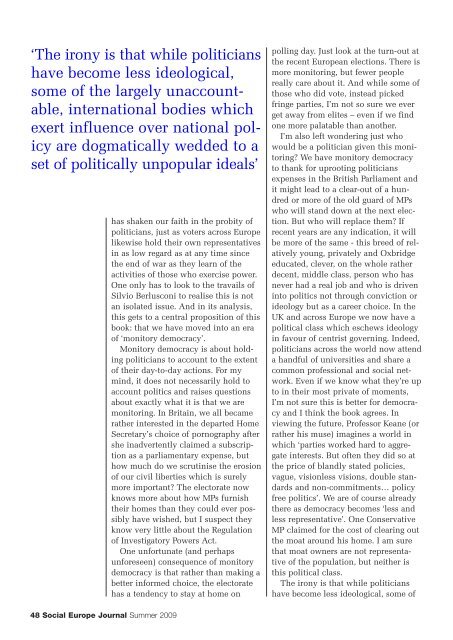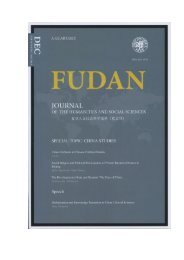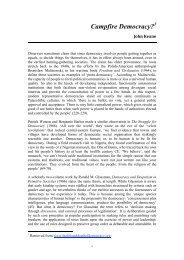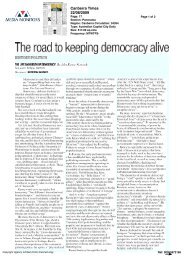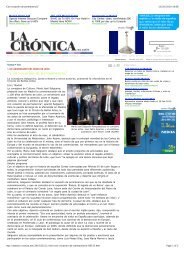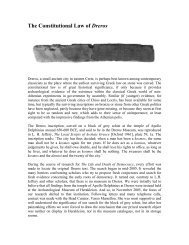The Ethics of Capitalism - Social Europe Journal
The Ethics of Capitalism - Social Europe Journal
The Ethics of Capitalism - Social Europe Journal
You also want an ePaper? Increase the reach of your titles
YUMPU automatically turns print PDFs into web optimized ePapers that Google loves.
‘<strong>The</strong> irony is that while politicians<br />
have become less ideological,<br />
some <strong>of</strong> the largely unaccountable,<br />
international bodies which<br />
exert influence over national policy<br />
are dogmatically wedded to a<br />
set <strong>of</strong> politically unpopular ideals’<br />
has shaken our faith in the probity <strong>of</strong><br />
politicians, just as voters across <strong>Europe</strong><br />
likewise hold their own representatives<br />
in as low regard as at any time since<br />
the end <strong>of</strong> war as they learn <strong>of</strong> the<br />
activities <strong>of</strong> those who exercise power.<br />
One only has to look to the travails <strong>of</strong><br />
Silvio Berlusconi to realise this is not<br />
an isolated issue. And in its analysis,<br />
this gets to a central proposition <strong>of</strong> this<br />
book: that we have moved into an era<br />
<strong>of</strong> ‘monitory democracy’.<br />
Monitory democracy is about holding<br />
politicians to account to the extent<br />
<strong>of</strong> their day-to-day actions. For my<br />
mind, it does not necessarily hold to<br />
account politics and raises questions<br />
about exactly what it is that we are<br />
monitoring. In Britain, we all became<br />
rather interested in the departed Home<br />
Secretary’s choice <strong>of</strong> pornography after<br />
she inadvertently claimed a subscription<br />
as a parliamentary expense, but<br />
how much do we scrutinise the erosion<br />
<strong>of</strong> our civil liberties which is surely<br />
more important <strong>The</strong> electorate now<br />
knows more about how MPs furnish<br />
their homes than they could ever possibly<br />
have wished, but I suspect they<br />
know very little about the Regulation<br />
<strong>of</strong> Investigatory Powers Act.<br />
One unfortunate (and perhaps<br />
unforeseen) consequence <strong>of</strong> monitory<br />
democracy is that rather than making a<br />
better informed choice, the electorate<br />
has a tendency to stay at home on<br />
polling day. Just look at the turn-out at<br />
the recent <strong>Europe</strong>an elections. <strong>The</strong>re is<br />
more monitoring, but fewer people<br />
really care about it. And while some <strong>of</strong><br />
those who did vote, instead picked<br />
fringe parties, I’m not so sure we ever<br />
get away from elites – even if we find<br />
one more palatable than another.<br />
I’m also left wondering just who<br />
would be a politician given this monitoring<br />
We have monitory democracy<br />
to thank for uprooting politicians<br />
expenses in the British Parliament and<br />
it might lead to a clear-out <strong>of</strong> a hundred<br />
or more <strong>of</strong> the old guard <strong>of</strong> MPs<br />
who will stand down at the next election.<br />
But who will replace them If<br />
recent years are any indication, it will<br />
be more <strong>of</strong> the same - this breed <strong>of</strong> relatively<br />
young, privately and Oxbridge<br />
educated, clever, on the whole rather<br />
decent, middle class, person who has<br />
never had a real job and who is driven<br />
into politics not through conviction or<br />
ideology but as a career choice. In the<br />
UK and across <strong>Europe</strong> we now have a<br />
political class which eschews ideology<br />
in favour <strong>of</strong> centrist governing. Indeed,<br />
politicians across the world now attend<br />
a handful <strong>of</strong> universities and share a<br />
common pr<strong>of</strong>essional and social network.<br />
Even if we know what they’re up<br />
to in their most private <strong>of</strong> moments,<br />
I’m not sure this is better for democracy<br />
and I think the book agrees. In<br />
viewing the future, Pr<strong>of</strong>essor Keane (or<br />
rather his muse) imagines a world in<br />
which ‘parties worked hard to aggregate<br />
interests. But <strong>of</strong>ten they did so at<br />
the price <strong>of</strong> blandly stated policies,<br />
vague, visionless visions, double standards<br />
and non-commitments… policy<br />
free politics’. We are <strong>of</strong> course already<br />
there as democracy becomes ‘less and<br />
less representative’. One Conservative<br />
MP claimed for the cost <strong>of</strong> clearing out<br />
the moat around his home. I am sure<br />
that moat owners are not representative<br />
<strong>of</strong> the population, but neither is<br />
this political class.<br />
<strong>The</strong> irony is that while politicians<br />
have become less ideological, some <strong>of</strong><br />
48 <strong>Social</strong> <strong>Europe</strong> <strong>Journal</strong> Summer 2009


